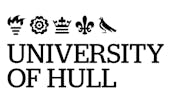
University of Hull

The University of Hull has been changing the world and changing lives since 1927. In a rapidly altering world, our research is responding to some of the biggest global challenges. Our current work ranges from health to habitats, food to flooding and supply chains to slavery.
We have appeared twice in Universities UK’s list of ‘100 discoveries by British universities that have changed the world’. Once for our globally renowned breakthrough in liquid crystal displays (facilitating the technology for screens on mobile phones, TVs, laptops and tablets); and once for our pioneering work on a bone density scanner for the earlier detection of osteoporosis. Our Wilberforce Institute has also won the Queen’s Anniversary Prize in recognition of its work combatting modern-day slavery.
We’ve been recognised for our academic impact: the University was named in the top 50 UK institutions for research power by Times Higher Education, based on the most recent Research Excellence Framework 2014.
The University’s collaborations are shaping the future. Building on the success of Hull’s reign as City of Culture, in which the University was a Principal Partner, the University is pleased to be bringing the best of British Science to Hull and the Humber in September 2018 by hosting the British Science Festival, giving the opportunity to showcase nationally the region’s significant contribution in this field.
Links
Displaying 141 - 160 of 384 articles




















